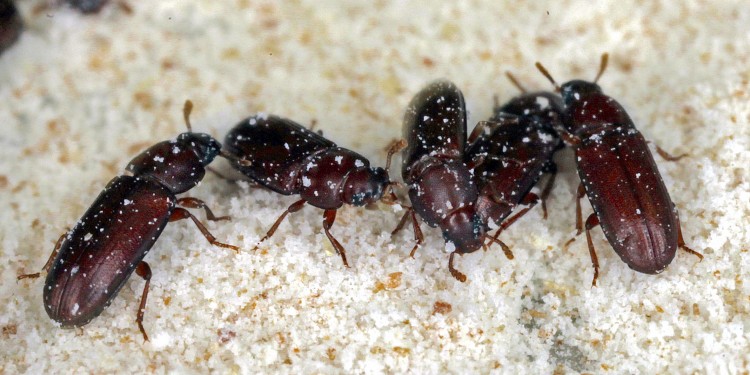
Specific immune response of beetles adapts to bacteria
When the immune system fends off pathogens, this can happen in a very wide variety of ways. For example, the immune system’s memory is able to distinguish a foreign protein with which the organism has already come into contact from another and to react with a corresponding antibody. Researchers have now investigated experimentally whether this ability of the immune system to specifically fend off pathogens can adapt in the course of evolution. To this end, they studied many successive generations of flour beetles – because insects can also specifically repel pathogens to a certain degree.
After the researchers repeatedly confronted the insects and their progeny with bacteria, they observed that the beetles’ immune system reacted more strongly after just a few generations. “Our study helps us to understand whether an immune system’s specificity ability can adapt quickly to the conditions of repeated confrontation with pathogens,” says Prof. Joachim Kurtz from Münster University, who is heading the study.
The results might be able to help provide a better understanding of molecular processes that play a role in the innate immune memory in humans and that could perhaps be used for medical purposes. As insects are well suited for experimental evolution, the information thus acquired could usefully complement existing knowledge on the immune system of mammals. The study has been published in the journal “PNAS” (Proceedings of the National Academy of Sciences).
Background and method:
The immune system in human beings consists of two main systems – the innate immune system and the adaptive one. The latter is the part which primarily “remembers” pathogens and can react specifically. Insects have a different immune system, but researchers have already been able to show that insects too are able to show a greater reaction to infections as a result of previous experience with pathogens. However, it has not yet been investigated whether this immunological specificity can adapt evolutionarily to the respective bacterial environment.
For their experiment, the evolutionary biologists collected data from more than 48,000 red flour beetles over a period of three years. They divided the beetles into different groups in order to expose them to different combinations of six different bacterial species in each case in the larval stage first killed and then living bacteria. In some of the groups, the researchers used the same bacteria within one generation; in the other groups they confronted the beetles with a variety of different bacteria. 14 generations and three years later, they produced the results of the experiment: beetles which had been exposed to the same type of bacteria for “vaccination” and infection had developed a higher specificity over generations. This helped the beetles especially whenever they had to defend themselves against Bacillus thuringiensis, a natural insect pathogen.
The increased specificity was demonstrated by the fact that after "vaccination" with this natural pathogen, a greater activation of certain genes could be detected which play a role for the immune system and metabolism. At the same time, the survival chances of the beetles rose after being infected with the bacterium – in contrast to beetles that had evolved towards a low specificity. “This means that for certain bacteria a high specificity can develop quickly during evolution – probably caused by changes in the immune genes,” say the lead authors, Dr. Kevin Ferro and Dr. Robert Peuß, who carried out the experiments as part of their PhDs at the Institute of Evolution and Biodiversity at Münster University. It was noticeable, however, that this change did not occur in all bacteria used in the experiment. One possible explanation for this might be the limited opportunities of insects to recognize and combat various antigens.
Relevance and prospects:
The molecular mechanisms identified in this experiment could be relevant for humans – in so-called ‘trained immunity’, a possibility being discussed in medicine for training the memory not only of the acquired, but also of the innate part of the immune system. Based on the newly acquired genetic data, the researchers want to take a more precise look at the immune memory of insects and “deactivate” the relevant genes using molecular-biological methods. In future, the researchers also want to examine the bacteria to see whether for example they develop faster when their host is prepared for them. As flour beetles are seen as a pest in food production, among others, the researchers’ results could help to find a new strategy to combat them.
In addition to the University of Münster, those involved in the study were the University of Kiel, the Max Planck Institute of Evolutionary Biology in Plön, the University of Arizona and the Stowers Institute for Medical Research in Kansas City.
Funding:
The study received financial support by the Priority Programme 1399 “Host-Parasite Coevolution – Rapid Reciprocal Adaptation and its Genetic Basis”, funded by the German Research Foundation from 2009 to 2015.
Original publication:
K. Ferro & R. Peuß et al. (2019): Experimental evolution of immunological specificity. PNAS; DOI: 10.1073/pnas.1904828116
